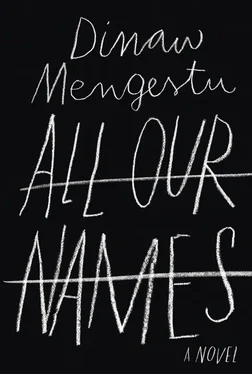He was gone before I could respond, but my answer was irrelevant to begin with. The ease with which he hardly bothered to distinguish fact from fiction told me that.
The preparations for Joseph’s war began in earnest that afternoon. I knew from Isaac that something violent was being planned, but that on its own was hardly remarkable. Violent dreams and more plausible violent plans were burning all across the capital, and I assumed this was merely the version I had stumbled into.
Over the course of a few hours that morning, the scale of Joseph’s maneuvers became evident. Pairs of men arrived in what felt like timed half-hour intervals. By the time Isaac came down and joined me in the courtyard, there were eight new bodies tucked away somewhere in that house, conferring in one of the rooms I implicitly understood were off limits. The presence of so many new faces was the kind of distraction Isaac and I needed. I had worried over how to approach him, and now here was something more extraordinary than his departure from our room in the middle of the night around which we could meet. Men in suits and men in fatigues. Men with pistols fastened at their belts. I should have been thinking of the fighting to come; instead, I was grateful for the distraction it offered.
“What do you think?” Isaac waved his arm across the courtyard and house as if it were a scenic view that he had made.
“Who are they?” I asked him.
He grinned and then threw his arm around me.
“They are the beginning,” he said. “Very soon there will be many more.”
The meeting that took place in the house that afternoon was the second-most-important conference in the capital’s history since independence. I had missed the first, but dreaming of the writers who had once gathered at the university had brought me here to begin with. I came for the writers and stayed for the war. The difference wasn’t as great as I would have thought.
Isaac did his best to narrate the movements for me.
That man is a colonel in the army.
He has a gold mine in the south.
That’s the brother of someone in Parliament.
I’ve heard he is a general in Tanzania.
And so it went on, until the entire second floor of the house had been filled with serious men whose guards and valets stood quietly in the living room. When the last guest arrived, the front door was closed; the gate was sealed shut. If Isaac was disappointed at being left outside, he didn’t show it.
“This feels very familiar,” he said, “like we’ve done it before.”
“I was thinking the same,” I said. “Do you know what they’re talking about this time?”
“I can guess,” he said.
And so could I. In a certain context, it was entirely predictable.
“What do you think would happen if I went inside?” I asked him.
Isaac looked around at the various guards stationed around the doors. He pointed to a tall, skinny man whose face was largely hidden behind gold-rimmed sunglasses.
“He would tell that guy standing next to him to shoot you.”
I looked closer at both men; it would have meant nothing for them to do that.
“And what if you tried?”
“Maybe they would let me in,” he said. “And then, immediately afterward, someone else would shoot you.”
“And what if I tried to leave?”
Isaac laughed.
“Then everyone here would take turns shooting you.”
He thought about it a second longer.
“And if that wasn’t enough, they would want to do the same to me next.”
I didn’t dare ask Isaac what guaranteed his safety. Without intending to, he had made it clear he could do little or nothing to protect mine, and so it was time I found a way to do so on my own.
The conference on the second floor broke before lunch. The orderly procession entering the house turned into a struggle to leave it. Armed guards fought to get their charges through the gate; I assumed this meant that things had gone poorly for Joseph and his movement, but just as the first group was leaving, he appeared in the doorway, beaming, and suddenly there was a second rush back to the front door to shake his hand goodbye. I noticed deference similar to the bow the guard had given him that morning, but now it came from privileged and powerful men who nodded their heads discreetly, as if catching sight of stains on their shoes that had appeared that instant.
“That’s it?” I asked Isaac. “It’s over already.”
“Joseph is very efficient,” he said. “He lived in England.”
Efficiency was only half the equation, however. There was a desperation not to be seen together outside for too long, even if it was in the courtyard of the house they had just met in. No one trusted even semi-private spaces; it was windowless rooms or nothing at all. I wondered somewhat romantically if that was how the writers who had met in the capital had felt — not wanted or hunted, but like outlaws.
Mere minutes after the last man left, three pickup trucks carrying loads draped under brownish-gray tarps pulled quickly into the courtyard. They had been waiting nearby for the congregation to vanish before entering. Isaac was right: England had made Joseph efficient. Isaac whispered into my ear, “Joseph wants you to see this.”
I could feel Joseph watching us from the doorway; knowing he was watching me gave me something to do.
Two men left each truck and set about untying the tarps. I had made no assumptions about what was underneath; I was so busy acting I didn’t know how to feel about the crates of unripe bananas and yams that lay in the trucks.
“Food for an army?” I asked Isaac.
“Something like that,” he said.
The men threw the boxes of food onto the ground; no one was troubled about the broken boxes or the damage done to the food. The piles of bananas and yams stood taller than me when, finally, the men reached the second load, buried beneath. They unloaded these crates carefully, one at a time, in teams of two, straight from the back of the trucks to the living room, where they were lined up in perfect rows. When there was only one box left, Joseph came out from the doorway and motioned with his hand for the lid to be opened. I couldn’t see the contents from where we stood. I had to wait for Joseph to dig in and pull out a body-length strip of bullets. He held it up as if it were a prize catch plucked from the sea, but it didn’t look like a fish, or even a snake gone limp. It looked like hundreds of metal casings clipped together. He held it up, I believe, specifically for me to see.
After the food was hoisted back into the truck beds, no one, not Isaac or Joseph or any of the guards, ever said that we were sitting on a large cache of weapons, enough to wipe out our neighborhood, a village, or to make at least a semi-valiant last stand if we were attacked. The closest we came to acknowledging the contents of those crates was later that evening, after the pickup trucks had left, blankets had been thrown over the crates, and the furniture moved back into place to hide it all. One of the guards carried in a crate of Kenyan beer. Joseph personally handed everyone a bottle.
“What should we toast to?” Isaac asked. I expected Joseph to say something like liberation, or freedom, or to our future victory, but he knew how trite and conventional that sounded. He raised his bottle and looked at everyone in the room. “We don’t toast to anything,” he said. “This isn’t a celebration. We’re trying to end the nightmare this nation has become.” We drank our beer, one after another. When Joseph left the room, Isaac whispered to me, “Maybe instead of guns we should have gotten him an alarm clock.” I raised my bottle to Isaac and said, “To never oversleeping.” Our bottles clinked just as Joseph came back in. I was afraid he would be angry to see us toast, but he was a light drinker, and the three beers he had quickly downed had softened his mood. He came over and put his arms around both our shoulders and said, “Be careful — tomorrow is an important day. I can’t have either of you lying in bed all day.”
Читать дальше












